AGRIPOWER
AGRICULTURE
ENERGY
FOOD
AGRICULTURE
ENERGY
FOOD
Agri-Power Bank is a water, energy and urban food security project that will increase primary production points, upgrades and extensions for existing Siyakhana Food Gardens, an integrated approach to aquaponics, agro-ecology and sustainable living methodologies. It will also contribute towards studies for urban agricultural production, bioclimatic research that facillitates opportunaties for systemic inner city revitilization and regeneration. The structure will serve as a ‘Living Laboratory’ for advancing agriculture within the urban water-energy-food security nexus.


For this proposed Agripower prototype, we are asking the question, is it possible to create a bioclimatic facade system for living in?
It will contribute towards studies for urban agricultiral production, and scientific bioclimatic research that facillitates opportunaties for systemic inner city revitilization and regeneration.The parking area is selected as the site for the “Agripower” prototype for urban farming. It is a science-based project that aims to revolutionize the way we produce food and energy. It will serve as a research facility, teaching space and market. The structure is designed as a vertical farm that can be used for scientific research and education, as well as for growing fresh produce. The structure will be built with scaffolding and will be able to house researchers and students from universities around the world who wish to participate in our experiments on food production in this unique environment in Johannesburg. We are looking to create an open kitchen, a lab, and micro rooms for sleeping with showers. Visitors will be welcomed to participate in the daily life of the living lab; groups inhabit the structure and proposed workshops while living the space. We want create solutions towards urban water-energy-food security.
 Fig. Lacaton & Vassal.
Fig. Lacaton & Vassal.
We present a project that is scientific in nature, one that is built on the foundations of the existing Siyakhana food gardens and its associated ecosystem. We hope to reinforce existing practices, utilise market technologies, and develop research for systemic ‘agritecture’ stategies to be applied towards inner city regeneration. The structure will serve as a ‘Living Laboratory’ for advancing agriculture within the urban water-energy-food security nexus. The buildin will have internal atmospheric observation for monitoring climate changes and generating renewable energy. The structure conceived as a type of meta lab that can accommodate visiting scientists, students and researchers. There is temporary accomodation for 24 researchers. It will apply affordable, recycled material finish that allows light and environmental control. The vertical assembly, production and management system would be widely applicable to many types of facilities including schools, hospitals or office buildings.


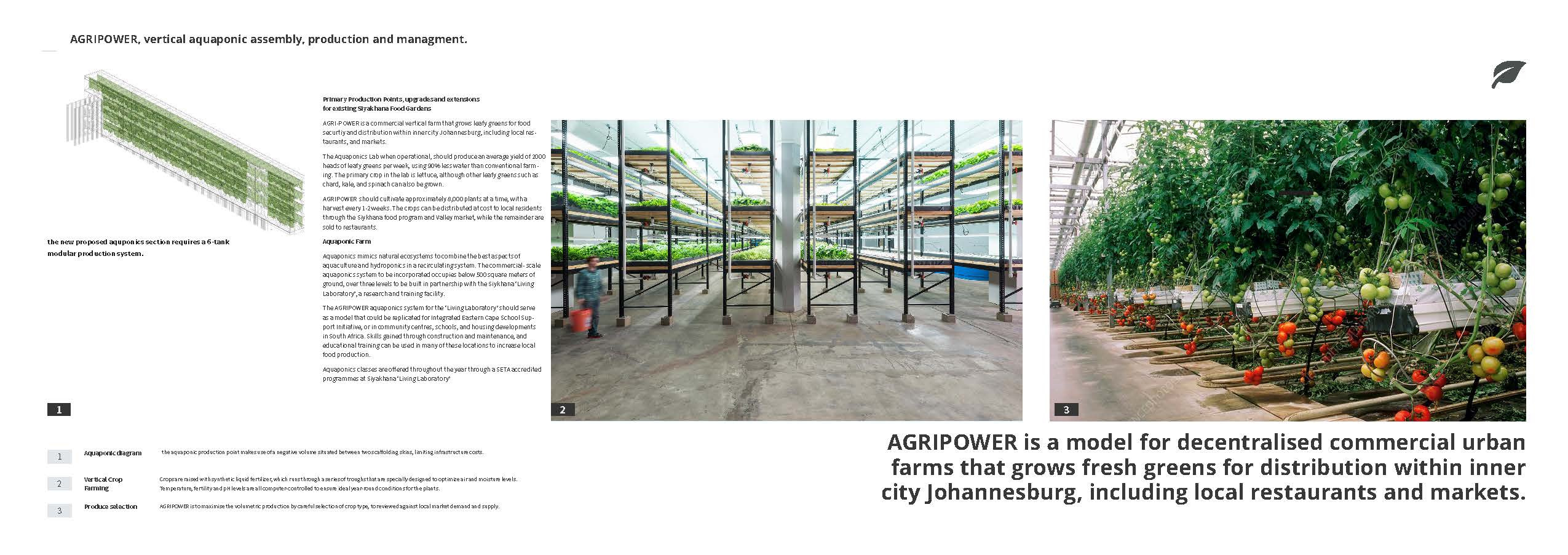



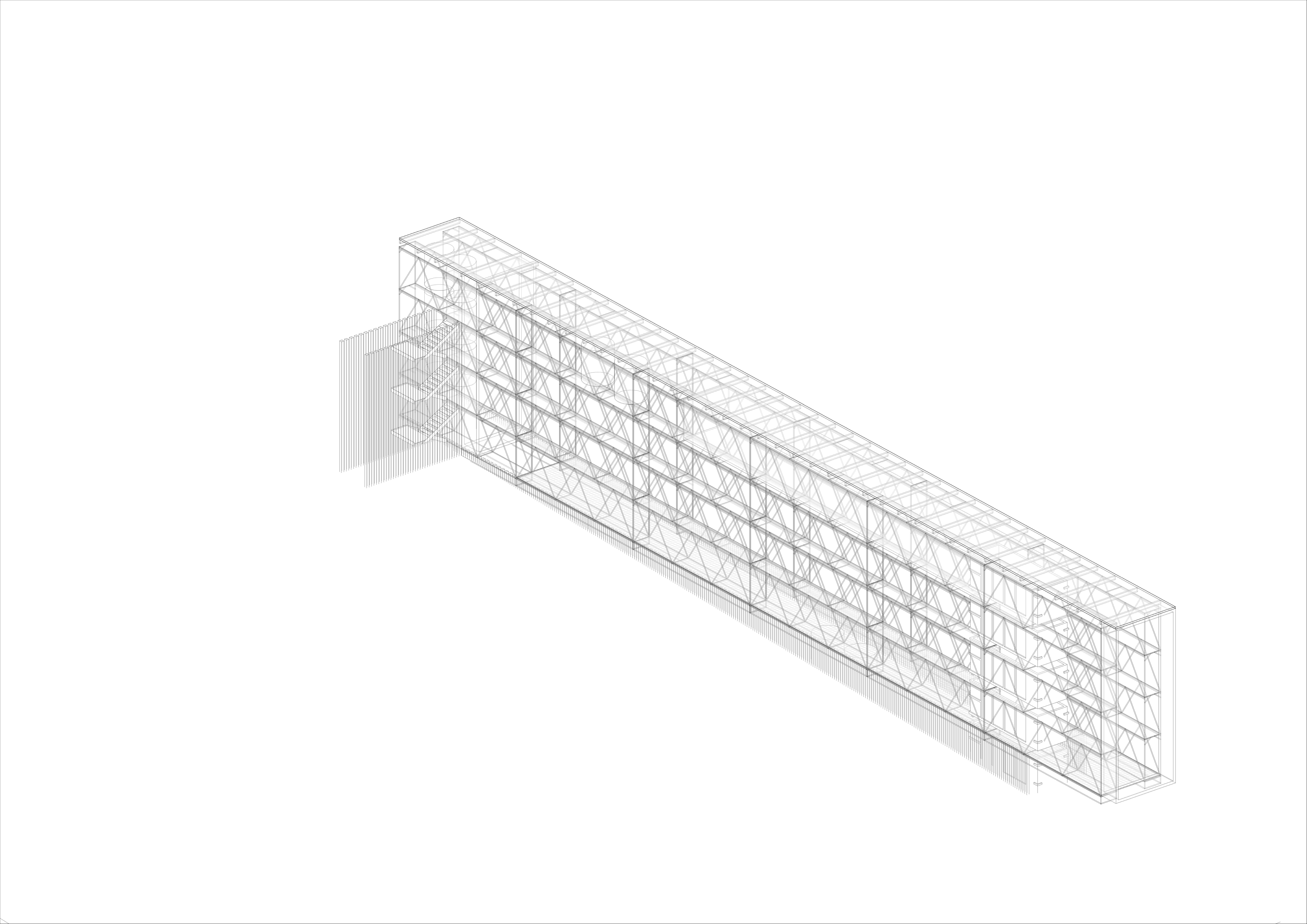
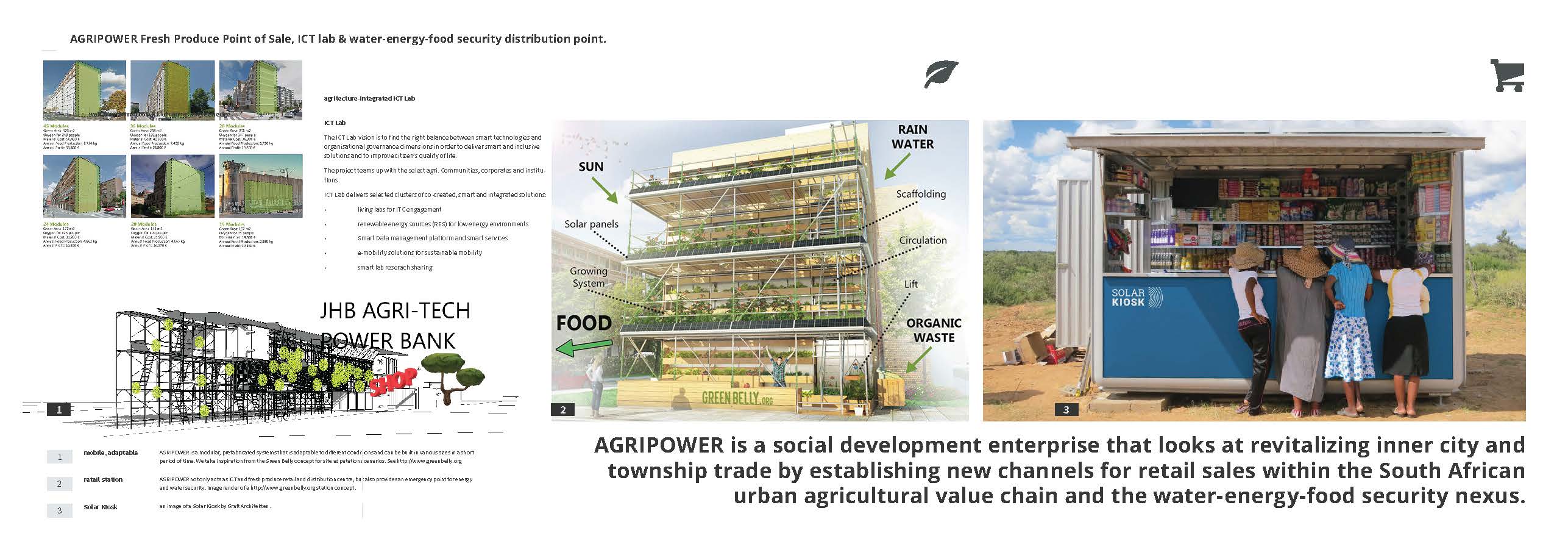


We also want to explore the potential of the station as a support structure for outdoor concerts and music festivals. The structure of the laboratory should double up as stage backdrop in the landscape of Bezuidenhout Park. We draw inspiration from summer concerts in Kirstenbosch Gardens. With up to 5000 visitors at any given time celebrating Johannesburgs talent, whether it’s Sipho “Hotstix” Mabuse or Black Coffee, we expect this space to be buzzing with activity.
The commercial vertical farm would grow leafy greens for food security and distribution within inner city Johannesburg, including local restaurants and markets. The Aquaponics Lab, when operational, should produce an average yield of 2000 heads of leafy greens per week, using 90% less water than conventional farming. The primary crop in the lab is lettuce, although other leafy greens such as chard, kale, and spinach can also be grown. It should cultivate approximately 8,000 plants at a time, with a harvest every 1-2 weeks. The crops can be distributed at cost to local residents through the Siykhana food program and Valley market, while the remainder are sold to restaurants. Aquaponics is a sustainable farming technique that combines the best aspects of aquaculture and hydroponics to create a recirculating system. Aquaponics mimics natural ecosystems and uses fish waste as a fertilizer for plants, which are grown in water. The commercial-scale aquaponics system at Siyakhana ‘Living Laboratory’ would occupy less than 500 square meters of ground, over three levels to be built in partnership with the University. The system should serve as a model that could be replicated in community centers, schools, and building developments across South Africa. Skills gained through construction and maintenance, and educational training can be used in many of these locations to increase local food production. The Living Lab is a place where you can learn everything you need to know about vertical crop farming. The lab has two main functions: education and research. Education is offered through accredited programs in aquaponics, hydroponics, beekeeping, bee medicine making, herbal medicine making and food preservation. Research is conducted with the goal of improving the quality of life for people in Southern Africa by developing new technologies for sustainable food production in the communities.

Vertical Crop Farming: for this method of farming we propose using the negative volume between two scaffolding skins limiting infrastructure costs. Crops are raised with synthetic liquid fertilizer which runs through a series of troughs specially designed to optimize air and moisture levels so that temperature, fertility and pH levels are always ideal year-round for your plants. Agripower is a model for decentralised commercial urban farms that grows fresh greens for distribution within inner city Johannesburg, including street vendors. The main goal of this project is to maximise the volumetric production by careful selection of crop type, to reviewed against local market demand and supply. The station will be a networked farming platform that combines modular farming systems, including mushroom production, seedling nursery & fresh produce refridgeration. For the initial prototype, primary production points, upgrades and extensions for existing Siyakhana Food Gardens will be implemented in order to increase productivity and decrease the carbon footprint of the system as a whole. Seedling Start Nursery: seedlings are the future of agriculture, and we want to help you grow your own. With our Seedling Start Nursery, we'll teach you how to plant, cultivate, and harvest your own food from seedling to harvest. This is an educational program that will be developed as a fledgling social development business working with neighbourhood community members and interns. We'll offer training classes on everything from growing techniques to planting schedules, so that you can create a thriving urban garden or even start your own business! The Mushroom Farm should produce beautiful, all-natural mushrooms for local community members and markets. Utilizing vertical space and designs that maximize yield per square meter, this “micro-farm” has a footprint of only 40 sq.m!
Agripower is an affordable, decentralized, and temporary urban farming system that is designed to be used in the creation of living laboratories across the city. The agritecture is comprised of a series of skins between two scaffolding systems, limiting infrastructure costs. Scaffolding systems are typically used for construction work and embody the primary assembly components for the structure. The temporary and modular nature of scaffolding allows for it to be easily adapted to different sizes and conditions. The volumetrics for agricultural production can be adjusted to create larger or smaller fresh produce production units. A negative volume situated as a model for decentralised commercial activity provides a space for bioclimatic experimentation with new methods of urban farming and inner city food distribution. Our unique proposition is to create habitable agritecture.
The structure uses water and solar energy to grow food on micro-urban scale.What is agritecture?
Agritecture is the art of cultivating crops within a controlled environment. By utilizing a variety of technologies, agritecture aims to produce food in an environmentally sustainable manner while reducing the use of chemicals, water and land. Agritecture is an innovative approach to farming that combines the best of traditional agriculture with technology. Agritecture is a new way of growing food in a sustainable and efficient way. It marries new technologies with traditional farming practices, using data analytics to increase yields and reduce waste. Agritecture is based on the concept of vertical farming, which uses high-density planting and controlled lighting to grow crops indoors with or without out soil or natural light. The crops are grown in stacked trays or towers, which are stacked vertically above each other. This allows farmers to control all aspects of plant growth—watering, fertilizing and growing conditions—all within a single space.
Agritecture offers a number of benefits over traditional methods of agriculture:
- Increases efficiency by reducing waste in production processes
- Allows farmers to grow crops year round regardless of weather conditions
- Helps preserve biodiversity by allowing farmers access to land that may not be suitable for conventional farming methods.
The Agripower prototype offers a unique approach to vertical farming. We use shipping containers to create modular production units for our mushroom farm, seedling nursery and packing refrigeration unit. Our shipping container system allows us to easily scale up or down as needed. We are also able to provide modular battery storage for solar energy which makes it possible for Agripower stations to run off-grid. In order to transfer the equivalent of one hectare of Siyakhana Food Gardens fresh produce growth into a vertical farm at only a fraction of the allowable land area, we need to minimise our inputs and maxismise our outputs as efficiently as possible. The introduction of container-based hydroponics and aquaponics systems would enable the development of highly productive urban farming systems. The ability to grow food in urban environments is a key element in creating sustainable, resilient communities, and containers offer a number of advantages over traditional open field agriculture. They are versatile, easy to transport, and can be stacked in multiples to maximize land use. They can also be placed in unconventional locations such as rooftops or empty lots.

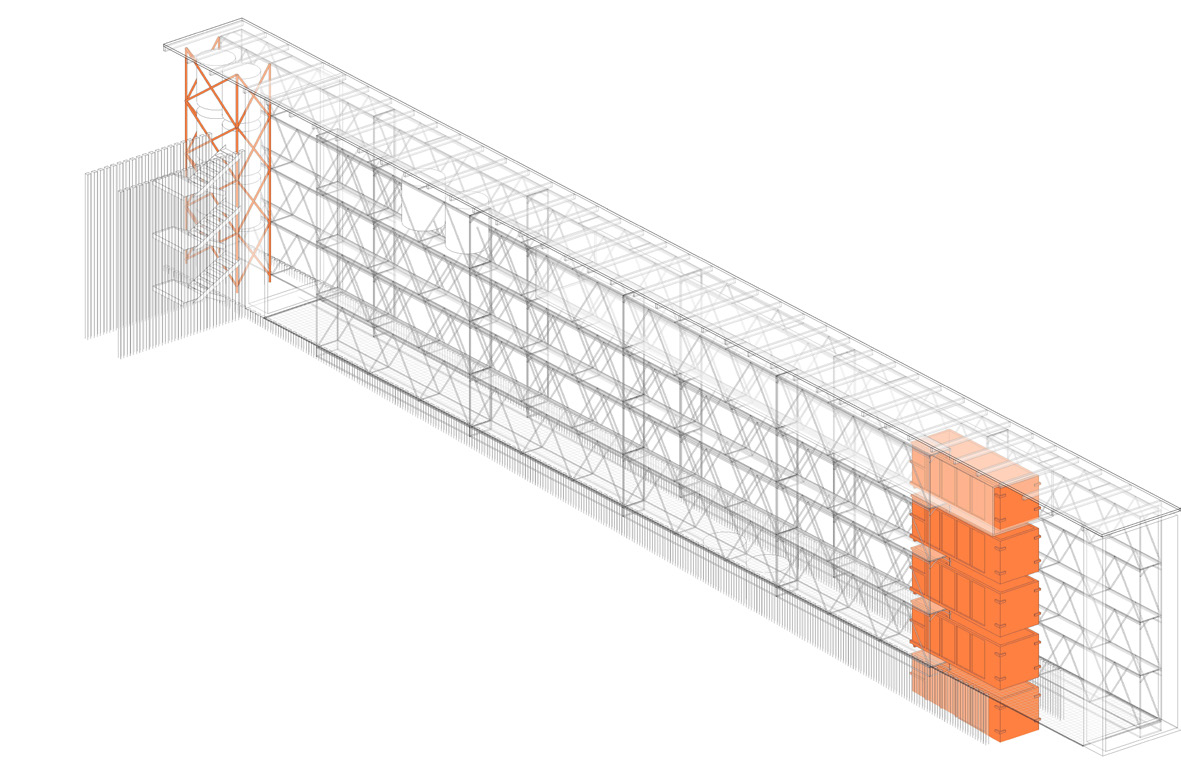

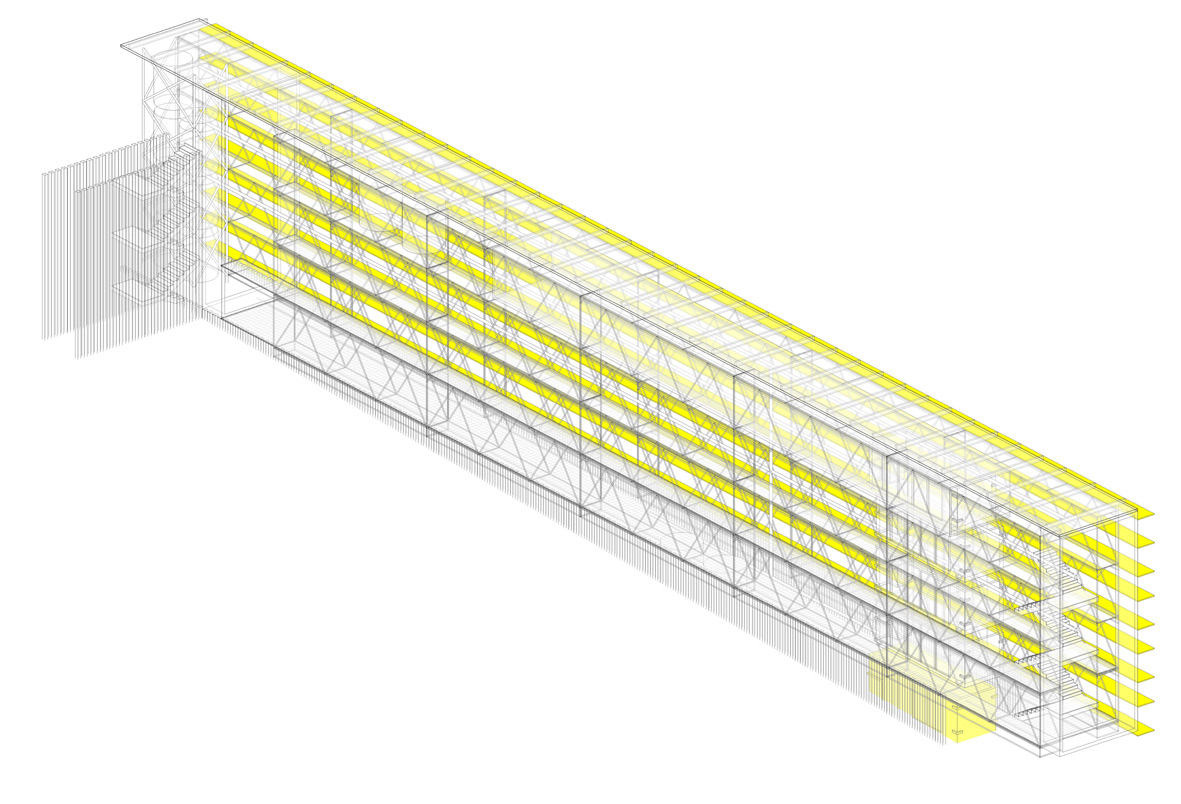
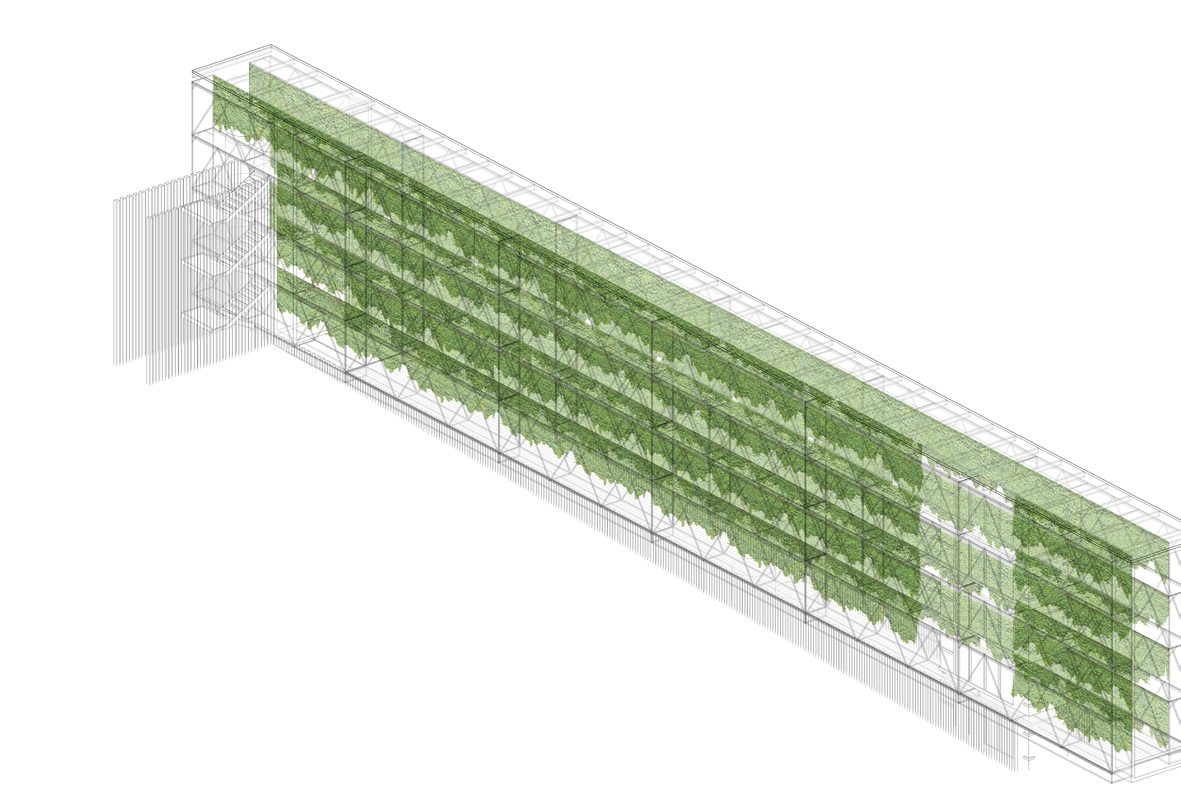
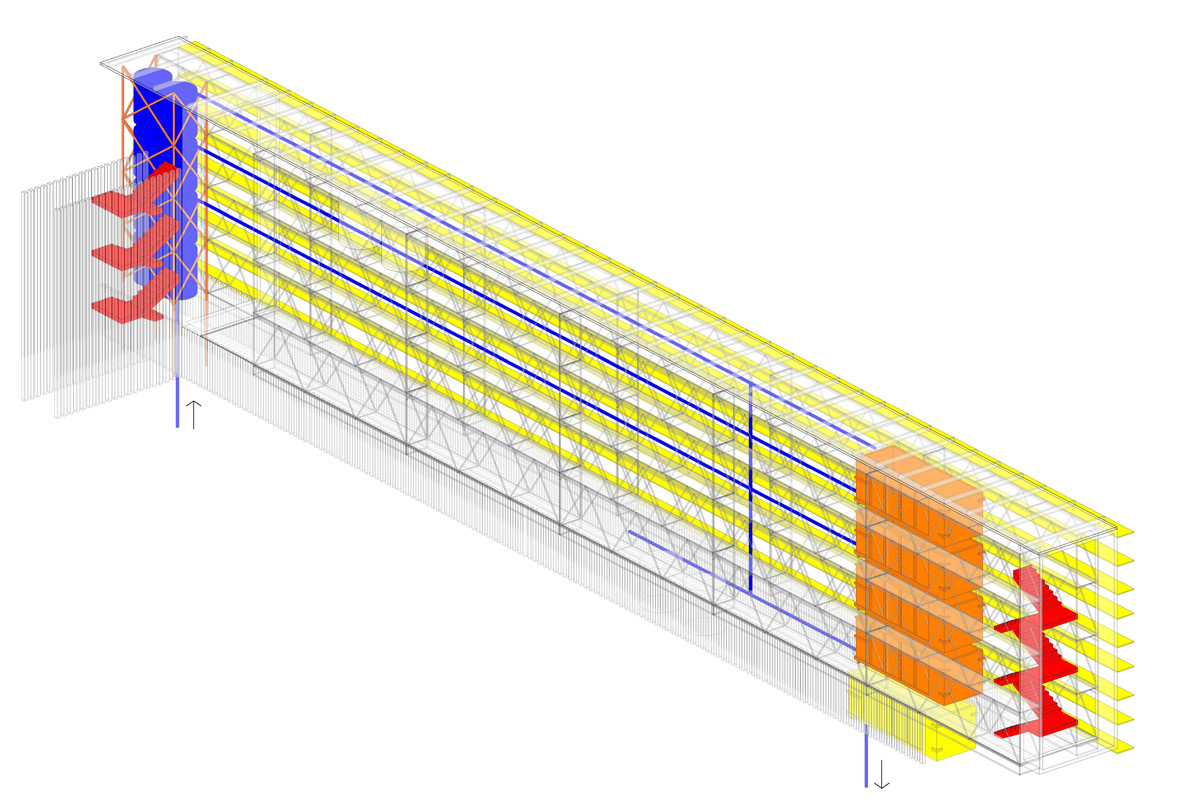
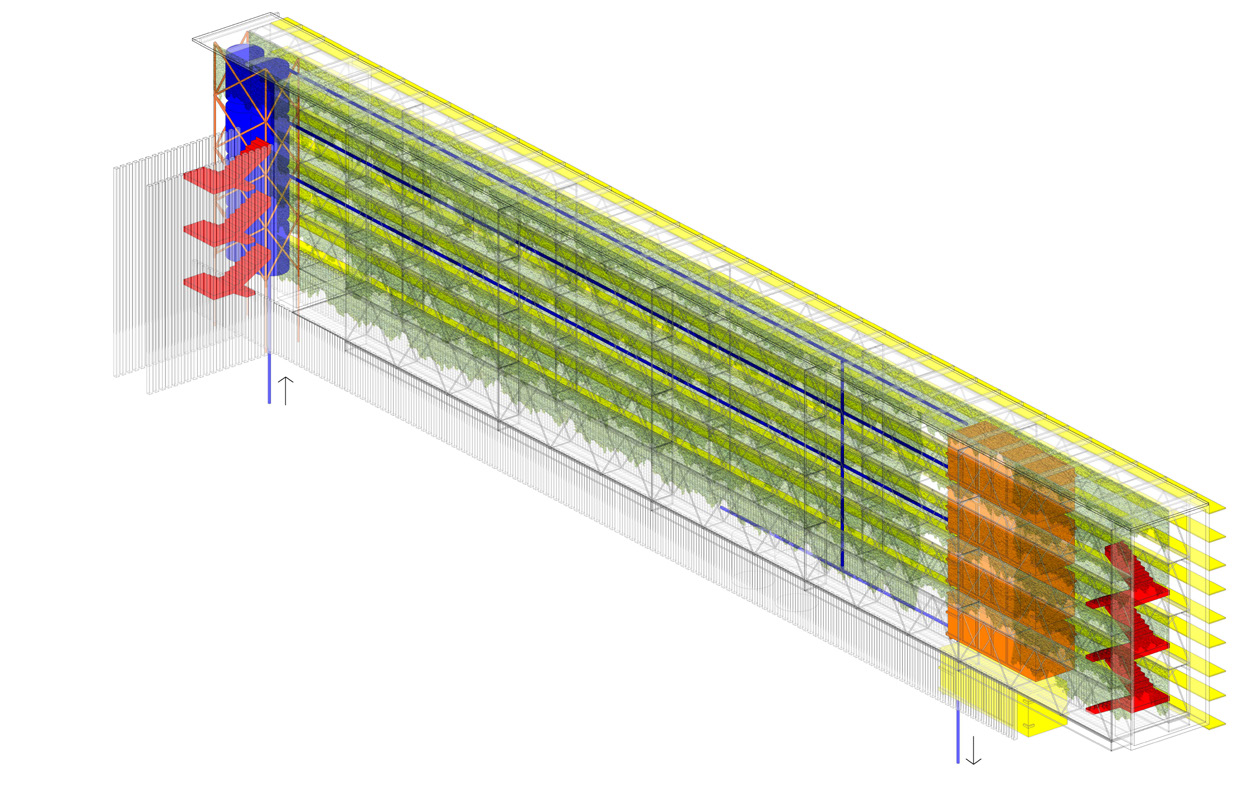
We use infrastructure as an instrument to create added value, not limiting it to its singular technological application. The structure uses water and solar energy to grow food on micro-urban scale. Solar-powered borehole extraction is the primary energy source for water extraction. Together with the stacked containers, the supporting structure acts as a point column. It also collects rainwater from the roof of the structure, which is then stored in JoJo tanks before being distributed along the length of the structure. The water is treated and fed to Siyakhana Food Gardens, or otherwise returned into the natural water table. Specialty water treatment design applications like systems designed by VOEKS engineering allow for aquaponic water purification.
It's also about building-integrated photovoltaic technologies and systems storage for energy security that can be scaled market distribution in Gauteng. BIPV are PV materials that are used in place of conventional building materials as an auxiliary source for power. BIPV integrates solar energy with that of building design and is used in various parts of building envelops such as roofs and facades. BIPV technology can be incorporated either during the construction of a new building or it can be retrofitted to an old building. Agripower explores sustainable low-tech applications to generate enough power for running basic services for agricultural production, and additional energy dependent on local needs i.e. if we plug on to a north façade of a building, can we provide appropriate shading and sunlight whilst generating power for the inhabitants?

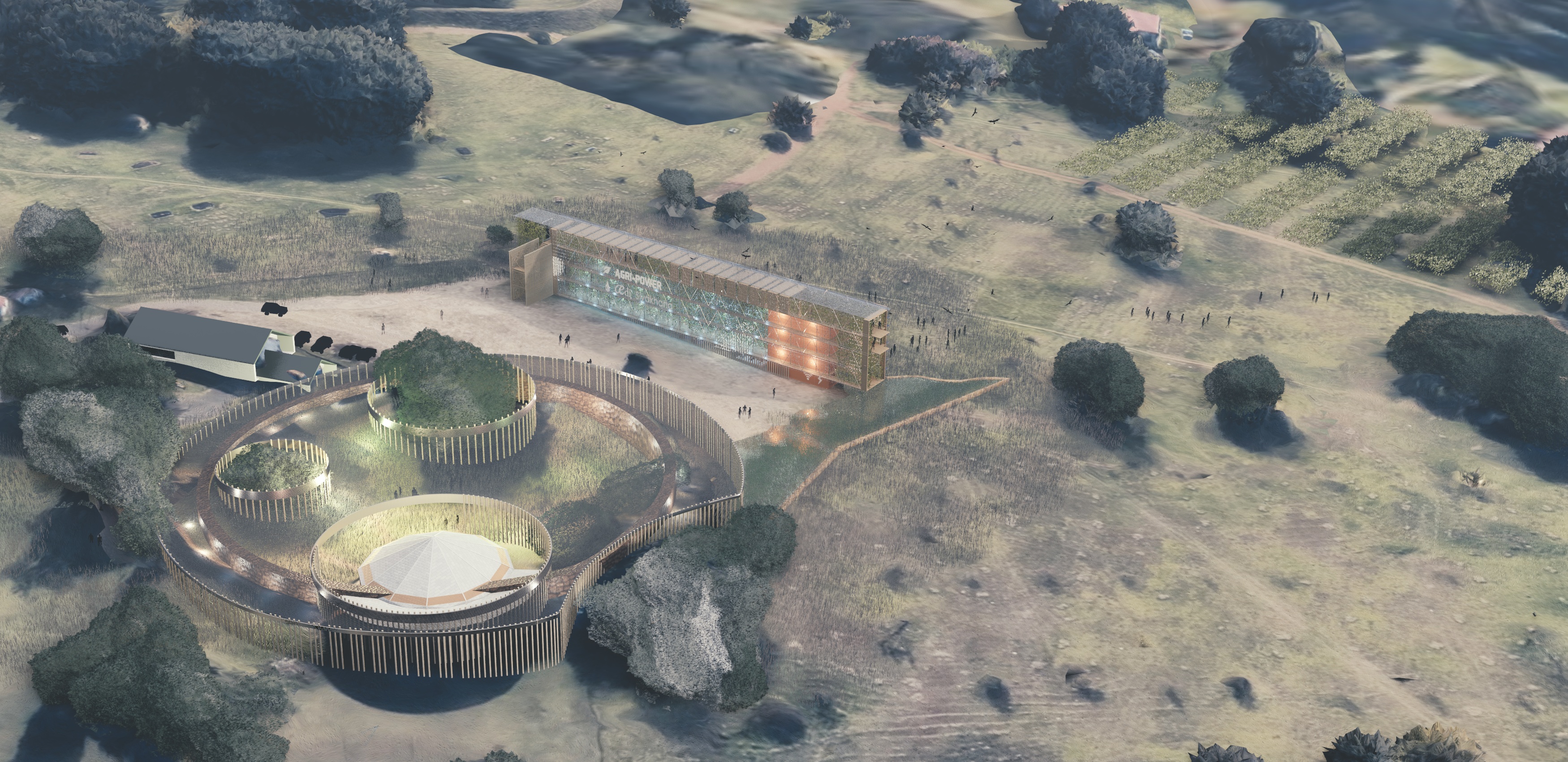
We will explore sustainable low-tech applications to generate enough power for running basic services for agricultural production, as well as requirements for additional energy security dependent on local needs. The objective is to create an integrated system of renewable energies and storage units with smart grid technology which enables maximum utilization of resources while providing food security.
Agripower explores the use of solar energy to provide an integrated system of food production, water management and electricity generation through solar photovoltaic panels and storage batteries in an urban environment with no access to any form of centralised power distribution network. The project aims at developing a prototype that can be replicated in other locations around johannesburg as well as provide technical training for local communities on how to build their own energy systems.
The system can also provide energy security by integrating into a local energy grid.
Small-scale energy storage can be
integrated into the structure, improving the users’ and local communities' energy
security energy reduction schedules, facilitating local production and consumption during power-outages.
By potentially integrating storage technologies into the local energy grid, and by connecting these storage facilities to the market, the energy system can subsidize local energy shortages in the grid as well as on the energy utilization in the station structure by its users. Studies for energy subsidies can range from increased self-sufficiency, power quality and network stability all the way to sustainable business models for local energy generation and storage.

The Agripower Fresh Produce Point of Sale, ICT lab & water-energy-food security distribution point is a station that integrates the storage technologies into local energy grid, as well as into the structure, and by connecting these storage facilities to the energy market, the energy system should impact on local energy flows in the smart grids as well as on the energy utilization in the structure by the users.
The station is also a place where new technologies are tested, prototyped and implemented in real life situations. A living lab is a space where people work together with their ideas, their knowledge and their skills to create new solutions for a better future. The ICT Lab is focused on agri-food systems, energy and mobility. The ICT Lab vision is to find the right balance between smart technologies and organisational governance dimensions in order to deliver smart and inclusive solutions and to improve citizen’s quality of life.
Agripower is a modular, prefabricated systems that is adaptable to different conditions and can be built in various sizes in a short period of time.
It is designed to be mobile, adaptable, and responsive to local conditions. This design enables it to be deployed in different sites and to serve as a retail station or solar kiosk.
It will provide access to fresh produce and other agricultural products while also serving as a platform for training programs and community engagement activities. Agripower is a social development enterprise that looks at revitalizing inner city and township trade by establishing new channels for retail sales within the South African urban agricultural value chain and the water-energy-food security nexus.
It seeks to do this by creating a network of urban farmers who will grow produce and distribute it to local retailers. The vertical farms will be located at publically accessible open spaces in urban areas, allowing them to take advantage of valuable wasted space and improve food security in cities with limited access to fresh food. Furthermore, by attaching station as bioclimatic facades to buildings, the systems can reduces the amount of energy needed for heating. This means it can help reduce greenhouse gas emissions while also improving the efficiency of our infrastructure.
TRANSITION DESIGN
AEDI STUDIO BERLIN, JOHANNESBURG.
AEDI STUDIO BERLIN, JOHANNESBURG.